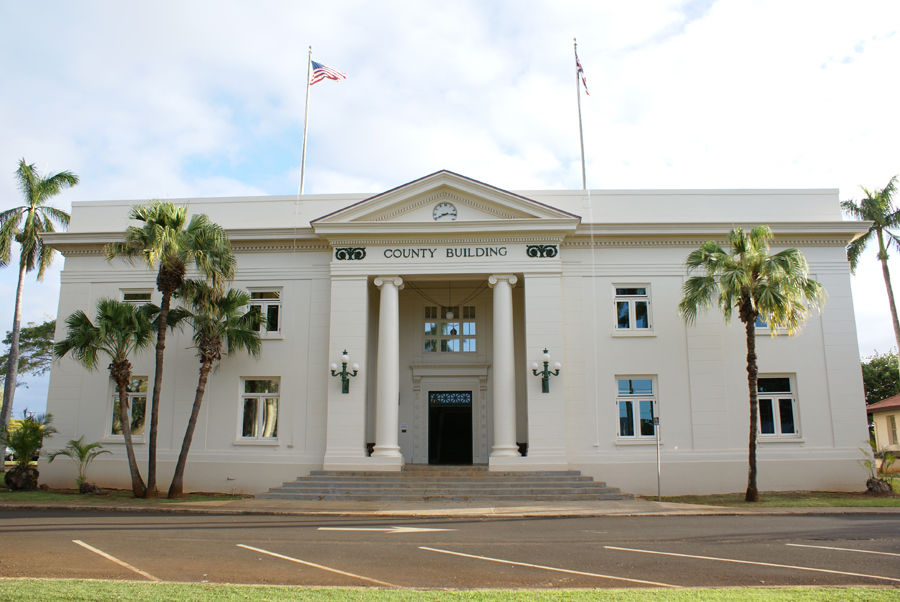LIHUE — No more questions. The Kauai County Council changed a rule on Wednesday that prohibits councilmembers from asking people who testify at their meetings follow up questions, even if it’s on the very topic about which the person is
LIHUE — No more questions.
The Kauai County Council changed a rule on Wednesday that prohibits councilmembers from asking people who testify at their meetings follow up questions, even if it’s on the very topic about which the person is testifying.
The rule change, championed by Council Chairman Mel Rapozo, was put in place to prevent councilmembers from badgering the public should they disagree with them, he said.
It was also made to prevent the politicians from using the platform to grandstand and to make meetings quicker, Rapozo said.
“The reality is we’ve had complaints from the public,” said Rapozo, who introduced the proposal that passed 4 to 2.
The feedback he’s heard is that questioning during public hearings at times gets so uncomfortable that people have told him they’d prefer not to speak up at all.
“The whole purpose of the rule is to encourage people to testify,” Rapozo said.
While the rule affects all councilmembers, it was intended primarily for JoAnn Yukimura, the councilor whom questions public speakers most often, he said.
“It’s gotten worse,” Rapozo said of Yukimura’s questioning of testifiers, which can stretch what should be six-minute speeches into something closer to 20 minutes. “I think it’s gotten worse.”
He said people testify to give their opinions for the council to consider. But Yukimura too often uses the platform to try and convince the testifier of her position, instead of listening to their stance, some said.
“Grandstand, pander, or humiliate the testifier,” Rapozo described it. “It’s unprofessional.”
Yukimura denied that was her MO. She said she does ask questions from her position on the seven-member council, but that’s because she’s being diligent understanding all sides of an issue that she will vote on — decisions that impact the whole island.
“The decisions we make are far reaching in many instances, so we have to have a thorough process,” she said of the rule change that she says will hinder good governing. “It’s really limiting our ability to problem solve and to know about the truth about the matter, whatever issue is before us.”
Yukimura, who has a law degree from the University of Washington, didn’t say whether she thought the rule change was personal when asked by The Garden Island.
“That’s not the issue,” she said. “The issue is how do we make our decisions? … And what are the best rules for that. That’s the question.”
As far as making meetings more efficient?
“If you are efficient in making the wrong decisions, where does that get you?” she said.
This is the first year the council has been together after last November’s election. Voting often splits down a 4-3 block. Yukimura and Gary Hooser are in the minority on those splits, and both voted against the rule change.
Councilors will be allowed to ask the testifier to repeat or rephrase a point. The old rule said that councilors can ask clarifiying questions. But Rapozo said too often questions strayed from clarifying. By giving the option to have them rephrase, communication won’t be lost. Council meetings stretch five, six hours, and the rule should knock that time down.
“We’re trying to make it fair,” he said. “This takes nothing away from the public.”
Robert Kremer, Jr. is one member of the public who said he felt badgered when Yukimura questioned him. He stood on the opposite side of the barking dog ordinance repeal debate and felt he was in a courtroom, not talking to the council.
“She asks you questions like a lawyer would,” he said. “It feels like you’re in court.”
Laura Craig, in an email forwarded by Rapozo to TGI, said she was “appalled at the amount of time that is being allowed” for the public testimony session to drag out because of questioning. Glenn Mickens, a frequent testifier at council meetings, said he agreed with Rapozo’s rule change.
Councilman Mason Chock was absent from the vote. Opponents of the rule attempted to have the issue deferred until Chock got back and public testimony on the matter could be taken, but that move failed.
But Chock on Thursday said he would have voted in support of the change. Now, the council needs to find a way to address when they can speak up — perhaps by county staff members — when blatantly incorrect information is being offered up.
But something had to be done, Chock said.
“What you’ve seen — and it’s not only JoAnn — I’ve seen people question testifiers until they get the answer they want,” he said.
And when the back and forth gets really off topic, it can look self-serving and reflects poorly on the whole body, he said.
“We look like idiots,” he said. “And we’re not. We’re actually smart people.”
Councilmembers Arryl Kaneshiro, KipuKai Kuali’i and Ross Kagawa joined Rapozo in support of the change.
“It’s a subtle change to get all councilmembers to listen to the testimony of citizens without interjecting our own views and positions,” Kuali’i wrote. “We’ve all been been guilty of asking ‘leading questions.’”
Hooser said the rule was “unquestionably about JoAnn Yukimura.”
He said the council chair has the power and responsibility to run the meeting in an orderly fashion. If discussion gets off topic, the chair should gavel it down. A blanket rule change for one person is excessive.
“Not allowed to ask speakers questions is way too heavy-handed and controlling and I think it’s dangerous to the process,” he said.
But running meetings more efficiently is what Rapozo said he’s trying to do. The rule change should help that, he said.
“That’s my job as a chair is to manage the meeting, and that’s what I’m trying to do,” he said.


